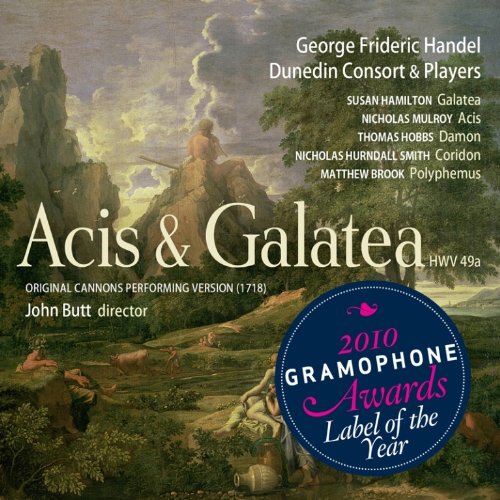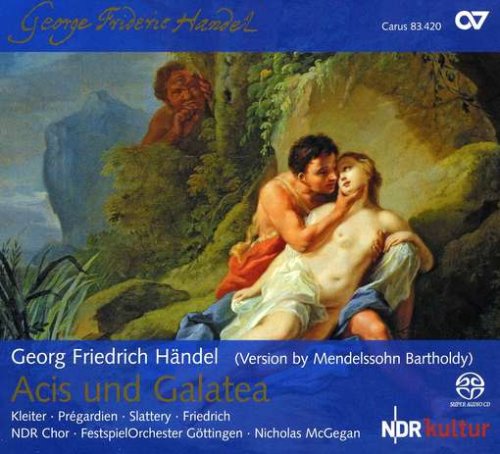Handel Acis and Galatea - Arranged by Mendelssohn
A magical performance of the fully-realised Cannons Acis and a Mendelssohn adaptation
View record and artist detailsRecord and Artist Details
Composer or Director: George Frideric Handel
Genre:
Opera
Label: Linn
Magazine Review Date: 1/2009
Media Format: CD or Download
Media Runtime: 95
Mastering:
Stereo
DDD
Catalogue Number: CKD319

Tracks:
| Composition | Artist Credit |
|---|---|
| Acis and Galatea |
George Frideric Handel, Composer
Dunedin Consort Dunedin Players George Frideric Handel, Composer John Butt, Conductor Matthew Brook, Bass Nicholas Hurndall Smith, Tenor Nicholas Mulroy, Tenor Susan Hamilton, Soprano Thomas Hobbs, Tenor |
Composer or Director: George Frideric Handel
Genre:
Vocal
Label: Carus
Magazine Review Date: 1/2009
Media Format: Super Audio CD
Media Runtime: 0
Catalogue Number: CARUS83420

Tracks:
| Composition | Artist Credit |
|---|---|
| Acis and Galatea |
George Frideric Handel, Composer
Christoph Prégardien, Tenor George Frideric Handel, Composer Göttingen Festival Orchestra Julia Kleiter, Soprano Nicholas McGegan, Conductor North German Radio Chorus |
Author: David Vickers
The Sinfonia brims with unforced personality, after which the pastoral chorus “O the pleasure of the plains” is relaxed, with the oboes given enough space to weave their imitative lines clearly. The five singers and the band are beautifully in proportion with each other, and Linn’s sound recording is stunningly good. Susan Hamilton’s light, articulate soprano is preferable to an operatic voice in the role of Galatea: her rendition of “Hush, ye pretty warbling choir” is notable for its affectionate delicacy, and she smoothly navigates the deceptively tricky leaps in “As when the dove”. Nicholas Mulroy’s Acis is resonant and suave, combining muscularity with elegance. In “Love in her eyes sits playing” the Dunedin Players sound as expansive and sonorous as any larger Baroque orchestra. The madrigal-like beauty of “Wretched lovers” is breathtaking: the blend and understanding between the five singers is deeply satisfying, and the menacing music to convey the arrival of Polyphemus is astutely integrated (the section “See what ample strides he takes” is magnificently measured). Matthew Brook’s Polyphemus is extrovert, powerful and amusing, but also arouses pity and tenderness from the listener in “I rage, I melt, I burn”. The dialogue between the hapless would-be seducer and the disgusted Galatea is superbly enacted by Brook and Hamilton. The roles of Damon (offering counsel to Acis) and Coridon (who advises Polyphemus to behave more gently) are admirably sung by Nicholas Hurndall Smith and Thomas Hobbs.
“The flocks shall leave the mountains” is slower than has become normal, but this better reveals its function as a tender love duet until the jealous Polyphemus can’t bear it any more. Furthermore, it sets up an ideal dramatic context for a pathos-laden performance of Acis’s death scene. The rapturous choral ensemble brings out the Purcellian quality in the unaccompanied final cadences of “Mourn all ye Muses”, and Galatea’s “Heart the seat of soft delight” is sublimely shaped by the recorder-players and radiantly sung by Hamilton. Butt’s direction from the harpsichord is a role model of taste and style, and he insightfully conveys the elusive changing tone of the story from pastoral romp into personal tragedy. Previous versions of merit still possess enduring appeal, but it seems to me that the Dunedins have transformed the way in which we can understand and enjoy Handel’s lovely early English masterpiece.
The virtues of Acis and Galatea were clear enough more than a century later for the 19-year-old Mendelssohn to arrange the work for the Berlin Sing-Akademie in 1828-29 (with a German version of the libretto prepared by his sister Fanny). One might uncharitably (but accurately) criticise that the teenage Mendelssohn’s feverish excitement at discovering Handel led to him throwing everything he could (almost including the kitchen sink, so it seems) at the music. Unlike Mozart’s more discreet and softer reorchestration of Acis (1788), there is an intense amount of intervention in Mendelssohn’s orchestral score, which is tailored for a full-scale symphony orchestra and large chorus.
Nicholas McGegan and his Göttingen Festival Orchestra, which features expert period-instrument players from all over the world, gave the modern premiere of Mendelssohn’s score at the 2008 Göttingen Handel Festival, and the ensuing recording is crisply detailed. The most amusing effects are huge bursts of brass and timpani explosions associated with Polyphemus, who is sung with gusto by Wolf Matthias Friedrich. Acis is sung with a hint of strain by Christoph Prégardien, and Julia Kleiter’s Galatea is efficient. The NDR Choir are jovial or doleful as the music requires. McGegan directs with liveliness, and it’s hard to imagine this arrangement receiving a better advocate. It’s bombastic and clumsy in comparison to Handel’s delightful original, but the young Mendelssohn’s perspective is entertaining.
Explore the world’s largest classical music catalogue on Apple Music Classical.
Included with an Apple Music subscription. Download now.

Gramophone Digital Club
- Digital Edition
- Digital Archive
- Reviews Database
- Events & Offers
From £9.20 / month
Subscribe
Gramophone Club
- Print Edition
- Digital Edition
- Digital Archive
- Reviews Database
- Events & Offers
From £11.45 / month
Subscribe
If you are a library, university or other organisation that would be interested in an institutional subscription to Gramophone please click here for further information.






